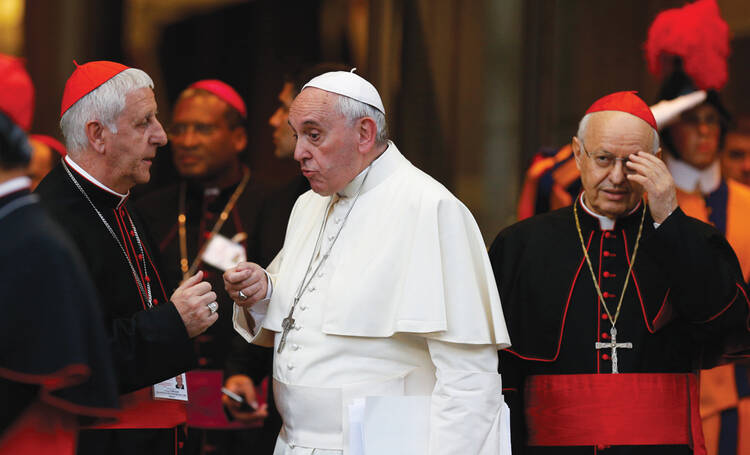After several days of animated debate over its official midterm report, the Synod of Bishops on the Family agreed on a final document more clearly grounded in traditional Catholic teaching. The assembly failed to reach consensus on the especially controversial questions of Communion for those who are divorced and civilly remarried and the pastoral care of gay and lesbian people that had brought heightened attention to the synod.
The synod’s last working session on Oct. 18 also featured a speech by Pope Francis that ended with a prolonged ovation from the synod fathers. The pope celebrated the members’ frank exchanges—even disagreements—while warning against extremism in the defense of tradition or in the pursuit of progress. “Personally, I would have been very worried and saddened if there hadn’t been these temptations and these animated discussions,” the pope said, “if everybody had agreed or remained silent in a false...peace.”
Discussions in the synod hall had grown heated after the release of a midterm report that used strikingly conciliatory language toward people with ways of life contrary to church teaching, including divorced and civilly remarried Catholics, cohabitating couples and those in same-sex unions. The summaries of working-group discussions, published on Oct. 16, showed a majority of synod fathers wanted the final document to be clearer about relevant church doctrine. The final report, which the pope ordered published almost at once after the synod’s conclusion, featured many more citations of Scripture, as well as new references to the Catechism of the Catholic Church.
Synod fathers voted on each of the document’s 62 paragraphs. Breaking with a 49-year old tradition in a move toward transparency in the synodal process, Pope Francis decided to publish the votes for each of the paragraphs in the final report so that the local churches and the Catholic clergy and faithful could see the level of support or opposition on each question. Three paragraphs failed to gain the two-thirds supermajority ordinarily required for approval of synodal documents.
Two of those paragraphs dealt with a controversial proposal by Cardinal Walter Kasper of Germany that would make it easier for divorced and civilly remarried Catholics to receive Communion. The document noted disagreements on the subject and recommended further study.
The document’s section on pastoral care for gay and lesbian people, which also fell short of supermajority approval, was significantly changed from the midterm report. The original section heading—“welcoming homosexuals”—was changed to “pastoral attention to persons with homosexual orientation,” and a statement that same-sex unions can be a “precious support in the life of the partners” was removed. The synod approved a proposal for streamlining the process for the annulment of marriages, including the introduction of an administrative process for annulments.
Federico Lombardi, S.J., the Vatican spokesman, told reporters that the absence of a supermajority indicated a lack of consensus and a need for more discussion. He noted that the final report did not carry doctrinal weight but would help set the agenda for the ordinary general assembly of the Synod of Bishops to be held in October 2015.
While reassuring the assembly that the church’s unity was not in danger, Pope Francis warned against five temptations he saw at work: a “hostile rigidity” that seeks refuge in the letter of the law; a “destructive do-goodism” based on a “false mercy,” which is a special temptation for “progressives and liberals”; transforming “bread into stone” and hurling it “against sinners, the weak and the ill” by imposing “impossible burdens”; coming down off the cross by “bending to the spirit of the world rather than purifying it”; and neglecting the “deposit of faith” by seeing oneself as its owner rather than its servant and neglecting reality by using “a smooth language in order to say a lot without saying anything.”








